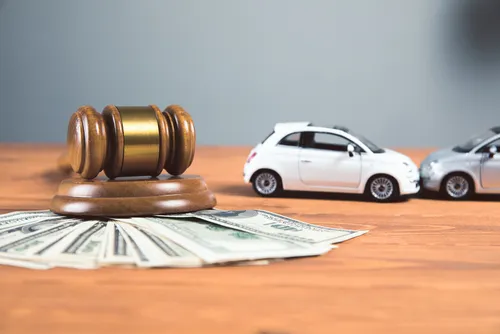At NC Car Accident Lawyers, we understand the serious impact a concussion can have on your life after a motor vehicle accident. Concussions, often referred to as mild traumatic brain injuries (TBIs), can result from sudden blows or jolts to the head in car, truck, and motorcycle accidents.
Navigating the legal process after a concussion can be challenging, especially when dealing with medical bills, lost wages, and ongoing treatment. Insurance companies may downplay the severity of your injury, making it difficult to secure a fair settlement.
Our experienced North Carolina car accident lawyers are here to help you pursue the compensation you deserve. Contact us today for a free consultation!
Concussion Symptoms
A concussion is a type of traumatic brain injury (TBI) caused by a sudden impact, jolt, or blow to the head. This impact causes the brain to move rapidly inside the skull, potentially leading to chemical changes in the brain and, in some cases, damage to brain cells. While concussions are often classified as mild TBIs, their effects can be severe and long-lasting, impacting a person’s ability to function normally.
Some of the most common symptoms of a concussion include:
- Headaches
- Dizziness or loss of balance
- Nausea or vomiting
- Confusion or difficulty concentrating
- Sensitivity to light or noise
- Blurred vision
- Memory problems
- Fatigue or drowsiness
- Mood changes, such as irritability, anxiety, or depression
- Sleep disturbances, including difficulty falling asleep or sleeping too much
In more severe cases, concussions can lead to long-term cognitive impairment or post-concussion syndrome, where symptoms persist for weeks or even months. Accident victims must seek medical attention as soon as possible after experiencing a head injury, even if symptoms seem mild at first.
Common Causes of Concussions
Concussions are common in motor vehicle accidents, including car, truck, and motorcycle crashes.
The sudden force experienced during a car crash can cause a driver or passenger’s head to hit the steering wheel, dashboard, or window, leading to a concussion. Even if there is no direct impact, the sheer force of acceleration and deceleration can cause the brain to move violently within the skull, resulting in injury.
- Rear-end collisions: Whiplash from being struck from behind can cause the brain to move rapidly inside the skull, leading to a concussion.
- Side-impact crashes: Also known as T-bone accidents, these crashes can cause the head to strike the window or door, increasing the risk of head trauma.
- Motorcycle accidents: Riders are particularly vulnerable to concussions, even when wearing helmets, as a fall or impact with another vehicle can cause significant brain trauma.
- Truck accidents: Due to their large size and force, truck accidents often result in more severe injuries, including concussions and other TBIs.
While traffic accidents are a leading cause of concussions, they are not the only source. Other common causes include sports injuries, falls, and assaults. If another party’s negligence caused the accident, the victim may be entitled to compensation for medical expenses, lost wages, and pain and suffering.
Treatment for a Concussion
Proper medical evaluation and treatment are crucial for anyone who has suffered a concussion, especially after a motor vehicle accident. While most concussions do not require surgery, patients need careful monitoring and medical management to prevent further complications.
The standard treatment for concussions includes:
- Rest and Recovery: Physical and mental rest is essential after a concussion. This means avoiding strenuous activities, limiting screen time, and refraining from activities that require intense concentration.
- Medical Supervision: A healthcare provider may conduct neurological exams, cognitive tests, and imaging scans to assess the extent of the injury.
- Pain Management: Over-the-counter pain relievers, such as acetaminophen, may be recommended. However, nonsteroidal anti-inflammatory drugs (NSAIDs) like ibuprofen should be avoided initially, as they can increase the risk of bleeding.
- Gradual Return to Activities: Resuming normal activities should be done gradually under the guidance of a doctor. Rushing back into work or physical activities can worsen symptoms and delay recovery.
- Physical and Cognitive Therapy: In some cases, therapy may be necessary to help balance, coordination, and cognitive function.
Ignoring symptoms or returning to normal activities too soon can lead to post-concussion syndrome, which can prolong symptoms for months or even years.
How Long Does a Concussion Last After an Accident?
The recovery time for a concussion varies depending on the severity of the injury and the individual’s overall health. In most cases, mild concussions resolve within 7 to 14 days, but some symptoms can persist for several weeks.
- Mild concussions: Symptoms typically improve within a couple of weeks, with full recovery occurring within a month.
- Moderate concussions: Some individuals experience symptoms for up to three months.
- Severe concussions: In rare cases, symptoms may last for six months or more, leading to a condition known as post-concussion syndrome.
Certain factors can prolong recovery, including previous concussions, pre-existing neurological conditions, and failure to follow proper treatment guidelines. Younger individuals and older adults may take longer to heal, and those who suffer from repeated concussions are at higher risk of long-term complications.
Compensation for a Concussion
Victims of concussions caused by motor vehicle accidents can pursue various forms of compensation.
- Medical Expenses: Coverage for hospital visits, diagnostic tests, medications, physical therapy, and any necessary long-term medical treatment.
- Lost Wages: Compensation for income lost due to missed work, as well as loss of future earning potential if the concussion results in long-term disability.
- Pain and Suffering: Damages for the physical pain and emotional distress caused by the concussion, including anxiety, depression, and diminished quality of life.
- Rehabilitation Costs: This includes ongoing therapy, rehabilitation, or cognitive treatment
- Punitive Damages: Victims may be awarded additional compensation in cases of severe negligence, such as drunk driving.
Average Car Accident Settlement for a Concussion in North Carolina
There is no single average settlement for a concussion in North Carolina. Car accident settlements for concussions can range from $20,000 to $80,000. Mild concussions tend to result in lower settlements, while serious brain injury cases may settle for $100,000 or more. Settlements for traumatic brain injuries that cause permanent disability can reach millions of dollars.
Contact Us Today for a Free Consultation
If you or a loved one has suffered a concussion due to a car, truck, or motorcycle accident, you may be entitled to compensation for your medical expenses, lost income, and pain and suffering. At NC Car Accident Lawyers, we understand the complexities of head injury claims and are committed to ensuring that accident victims receive the financial support they need to recover.
Insurance companies often try to minimize claims by downplaying symptoms or disputing the cause of the injury. Our team has extensive experience handling personal injury cases and knows how to fight back against insurance tactics.
If you have been injured in an accident, don’t wait to seek legal guidance. Contact NC Car Accident Lawyers today for a free consultation, and let us help you navigate the path to recovery.






